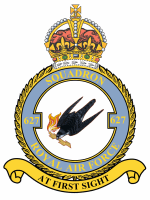No. 627 Squadron RAF
| No. 627 Squadron RAF | |
|---|---|
 Official Squadron badge of No. 627 Squadron RAF | |
| Active | 12 November 1943 – 1 October 1945 |
| Country | |
| Branch | |
| Role | Pathfinder Bomber Squadron |
| Motto(s) | At First Sight[1][2] |
| Insignia | |
| Squadron Badge heraldry | A hawk diving, holding in the beak a firebrand[2] The badge symbolises two of the unit's wartime functions - high-level bombing and target marking for the main heavy bomber force.[1] |
| Squadron Codes | AZ (November 1943 – October 1945)[3][4] |
| Aircraft flown | |
| Bomber | de Havilland Mosquito Twin-engined light fighter-bomber |
No. 627 Squadron was a Royal Air Force Mosquito aircraft pathfinder bomber squadron that operated during the Second World War.[2]
History
[edit]The squadron was formed on 12 November 1943 at RAF Oakington from part of 139 Squadron.[5] It was equipped with the de Havilland Mosquito twin-engined fighter-bomber it flew operations as part of No. 8 Group's light bomber force.[6] As well as normal bombing missions it also carried out Pathfinder duties and was involved in attacks on Berlin in early 1944.[6] In April 1944 it was transferred to No. 5 Group as a specialised target marking squadron, although it also carried out armed reconnaissance and normal bombing duties.[6] It was disbanded on 1 October 1945 at RAF Woodhall Spa when it was re-numbered 109 Squadron.[2][5][6]
Aircraft operated
[edit]| From | To | Aircraft | Variant |
|---|---|---|---|
| November 1943 | September 1945 | De Havilland Mosquito | Mk.IV |
| July 1944 | September 1945 | De Havilland Mosquito | Mk.XX |
| October 1944 | September 1945 | De Havilland Mosquito | Mk.XXV |
| March 1945 | September 1945 | De Havilland Mosquito | Mk.XVI |
Squadron bases
[edit]
| From | To | Base |
|---|---|---|
| November 1943 | April 1944 | RAF Oakington, Cambridgeshire |
| April 1944 | September 1945 | RAF Woodhall Spa, Lincolnshire |
Commanding officers
[edit]| From | To | Name |
|---|---|---|
| 13 November 1943 | 3 June 1944 | W/Cdr. R.P. Elliott, DSO, DFC* |
| 3 June 1944 | 22 January 1945 | W/Cdr. G.W. Curry, DSO, DFC* |
| 22 January 1945 | 17 March 1945 | W/Cdr. B.R.W. Hallows, DFC |
| 10 April 1945 | 1 June 1945 | W/Cdr. R. Kingsford-Smith, DSO, DFC, RAAF |
| 1 June 1945 | 30 September 1945 | W/Cdr. C. W. Scott AFC, RNZAF |
See also
[edit]References
[edit]Notes
[edit]- ^ a b c Moyes 1976, p. 288.
- ^ a b c d e f Halley 1988, p. 441.
- ^ Bowyer & Rawlings 1979, p. 19.
- ^ Flintham & Thomas 2003, p. 64.
- ^ a b c d Jefford 2001, p. 102.
- ^ a b c d Orbis 1985, p. 4257.
- ^ Bowyer 1984, p. 128.
- ^ Webb 1991, p. xii.
Bibliography
[edit]- Bowyer, Chaz (1984). Mosquito Squadrons of the Royal Air Force. Shepperton, Surrey, UK: Ian Allan Ltd. ISBN 0-7110-1425-6.
- Bowyer, Michael J.F.; Rawlings, John D.R. (1979). Squadron Codes, 1937–56. Cambridge, UK: Patrick Stephens Ltd. ISBN 0-85059-364-6.
- Flintham, Vic; Thomas, Andrew (2003). Combat Codes: A Full Explanation and Listing of British, Commonwealth and Allied Air Force Unit Codes since 1938. Shrewsbury, Shropshire, UK: Airlife Publishing Ltd. ISBN 1-84037-281-8.
- Halley, James J. (1988). The Squadrons of the Royal Air Force & Commonwealth, 1918–1988. Tonbridge, Kent, UK: Air-Britain (Historians) Ltd. ISBN 0-85130-164-9.
- Jefford, C.G. (2001). RAF Squadrons, a Comprehensive record of the Movement and Equipment of all RAF Squadrons and their Antecedents since 1912 (2nd ed.). Shrewsbury, Shropshire, UK: Airlife Publishing Ltd. ISBN 1-85310-053-6.
- Moyes, Philip J.R. (1976). Bomber Squadrons of the RAF and their Aircraft. London: Macdonald and Jane's (Publishers) Ltd. ISBN 0-354-01027-1.
- Ward, Cris (1998). Royal Air Force Bomber Command Squadron Profiles, Number 123: 627 Squadron. "At First Sight". Berkshire, UK: Ward Publishing.
- Webb, Alan B. (1991). At First Sight: A Factual and Anecdotal Account of No.627 Squadron Royal Air Force 1943-1945. St.Albans, UK: The Mosquito Aircraft Museum. ISBN 0-9517534-0-1.
- The Illustrated Encyclopedia of Aircraft (Part Work 1982-1985). Orbis Publishing.
